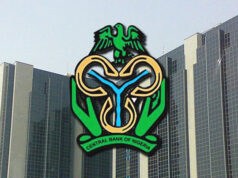Over 13 million direct and indirect jobs have been created through said Nigeria’s agricultural revolution in the last seven and half-years.
President Muhammadu Buhari made the disclosure on Friday in Washington D.C.
The President disclosed this at an interactive session entitled, “A conversation with President Muhammadu Buhari of Nigeria”, co-hosted by the United State Institute of Peace (USIP), the International Republican Institute, the National Endowment for Democracy, and the International Foundation for Electoral Systems.
Buhari said Nigeria’s economy has registered positive growth in the last two quarters despite the gloomy outlook in global economy, and the war in Ukraine.
Expounding on steps taken by his administration to expand Nigeria’s economy since coming into power in 2015, the President said focused interventions in agriculture driven by the Central Bank of Nigeria transitioned the country from being a net importer of rice, Nigeria’s staple food, to becoming self-sufficient in its production.
“This same scheme has financed the establishment and operations of our 50 integrated rice mills.
READ ALSO: Buhari: Africa’s icon of democracy, anti-corruption @ 80
“It has also financed over 4.5 million smallholder farmers, ensured the cultivation of almost 6 million hectares of farm land and almost 700 large scale agricultural projects have been funded.
“This agricultural revolution has led to the creation of over 13m direct and indirect jobs,” he said.
President Buhari also told the Washington D.C Community of global thought leaders and Democracy Advocacy Groups that the focus on the Agricultural Sector placed Nigeria in a better position to handle the systemic shock caused by both COVID-19 and the Russia-Ukraine war on global food supply chains and attendant price spikes.
He added that the revolution in the sector has improved the country’s capacity in the agro-allied sector, making it more efficient in enhancing and maximizing production yields and post-harvest losses.
“The non-oil sector remains the future of our economy and I hope successive governments will consolidate on the gains we have recorded under my leadership.
“You will agree with me that the Russia-Ukraine war has compelled many economies to carry out reforms and re-adjust policies to cope with the challenges posed by the conflict.
“In this regard, we are paying more attention now to energy transmission and distribution through targeted collaboration with global companies like Siemens to improve our efficiency in the Power Value Chain,” he said.
- Bricklayer jailed 8 months for stealing 12 bags of cement - May 9, 2024
- On resignation of Ihedioha, et al from PDP - May 9, 2024
- Abuja civil servant arraigns for N135m fraud - May 9, 2024










